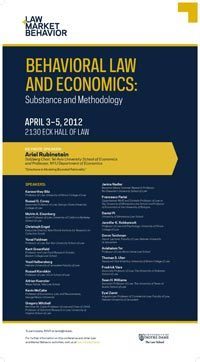LAMB Conference: Behavioral Law and Economics: Substance and Methodology
 For several decades, one of the leading approaches to legal theory has been the economic analysis of law. The theory of human behavior underlying standard economic analysis of law (like economic analysis more generally) is the rational choice theory. According to this theory, people strive to enhance their own well-being, choosing the available option that would maximize their expected utility. In the past two decades or so, hand-in-hand with comparable developments in economics, the economic analysis of law has been challenged by a growing body of experimental and empirical studies attesting to prevalent and systematic deviations from the assumptions of economic rationality. These studies have questioned both the assumption of thin, cognitive rationality (by showing that people’s preferences often do not comply with the rules of dominance, transitivity, and invariance) and the assumption of thick, motivational rationality (by pointing to the role of motivations such as envy and altruism).
For several decades, one of the leading approaches to legal theory has been the economic analysis of law. The theory of human behavior underlying standard economic analysis of law (like economic analysis more generally) is the rational choice theory. According to this theory, people strive to enhance their own well-being, choosing the available option that would maximize their expected utility. In the past two decades or so, hand-in-hand with comparable developments in economics, the economic analysis of law has been challenged by a growing body of experimental and empirical studies attesting to prevalent and systematic deviations from the assumptions of economic rationality. These studies have questioned both the assumption of thin, cognitive rationality (by showing that people’s preferences often do not comply with the rules of dominance, transitivity, and invariance) and the assumption of thick, motivational rationality (by pointing to the role of motivations such as envy and altruism).
Initially perceived as the antithesis to standard law and economics, over time these insights have been largely integrated into mainstream economic analysis of law, thereby establishing a new field of inquiry: behavioral law and economics. Behavioral insights can have particular value for legal analysis, as legal scholars are often interested in real-life policy-making, which must take into account people’s actual behavioral characteristics. Moreover, the growing influence of behavioral law and economics has been accompanied in recent years by the emergence of empirical and experimental legal studies. Rather than only draw on the results of experimental and empirical studies in the social sciences, a steadily growing number of researchers now engage in experimental and empirical studies designed specifically to answer questions that are of especial interest to legal scholarship.
The dramatic growth and influence of behavioral and experimental law and economics deserves close study and attention, to which this conference is devoted. Specifically, the conference builds on the contribution of leading scholars in the field to a first-of-its-kind “Handbook on Behavioral Economics and the Law” that will be published by Oxford University Press, offering a unique forum to examine the state-of-the-art of behavioral analysis throughout the law, its methodology and future challenges.
Conference Participants Only
Conference participants include:
Kenworthey Bilz
Professor of Law, University of Illinois College of Law
Chapter Title: Law, Moral Attitudes, and Behavioral Change
• Abstract
Russell Covey
Associate Professor of Law, Georgia State University College of Law
Chapter Title: Behavioral Economics and Plea Bargaining
• Abstract
Melvin Eisenberg
Koret Professor of Law, University of California Berkeley School of Law
Chapter Title: Behavioral Economics and Contract Law
• Abstract
Christoph Engel
Director, Max Planck Institute of Research on Collective Goods
Chapter Title: Behavioral Law and Economics: Empirical Methods
• Abstract
Yuval Feldman
Professor of Law, Bar Ilan University School of Law
Chapter Title: Behavioral Ethics Meets Behavioral Law and Economics
• Abstract
Kent Greenfield
Professor and Law Fund Research Scholar, Boston College Law School
Chapter Title: The End of Contractarianism? Behavioral Economics and the Law of Corporations
• Abstract
Yoed Halbersberg
Hebrew University of Jerusalem Faculty of Law
Chapter Title: The Behavioral Economics of Tort Law
• Abstract
Russell Korobkin
Professor of Law, UCLA Law School
Chapter Title: Wrestling with the Endowment Effect, or How to Do Law-and-Economics without the Coase Theorem
• Abstract
Adrian Kuenzler
Yale Law School
Chapter Title: Environmental Law
• Abstract
Kevin McCabe
Professor of Law and Economics, George Mason University
Chapter Title: Neuroeconomics and the Law
• Abstract
Gregory Mitchell
Mortimer M. Caplin Professor of Law and Class of 1948 Professor of Scholarly Research in Law, University of Virginia School of Law
Chapter Title: Alternative BLEs
• Abstract
Janice Nadler
Benjamin Mazur Summer Research Professor, Northwestern Law
Chapter Title: Law, Moral Attitudes, and Behavioral Change
• Abstract
Francesco Parisi
Oppenheimer Wolff and Donnelly Professor of Law, University of Minnesota Law School
Professor of Economics, University of Bologna
Chapter Title: Biasing, Debiasing, and the Law
• Abstract
Daniel Pi
University of Minnesota Law School
Chapter Title: Biasing, Debiasing, and the Law
• Abstract
Jennifer Robbennolt
Professor of Law and Psychology, University of Illinois College of Law
Chapter Title: Litigation and Settlement
• Abstract
Ariel Rubinstein
Salzberg Chair, Tel Aviv University School of Economics
Professor, NYU Department of Economics
Chapter Title: Directions in Modeling Bounded Rationality
• Abstract
Doron Teichman
Senior Lecturer, Hebrew University of Jerusalem Faculty of Law
Chapter Title: The Hindsight Bias and the Law in Hindsight
• Abstract
Avishalom Tor
Professor of Law, Notre Dame Law School
Chapter Title: The Market, the Firm, and Behavioral Antitrust
• Abstract
Thomas Ulen
Swanlund Chair, University of Illinois College of Law
Chapter Title: Behavioral Law and Economics: A Theoretical Overview
• Abstract
Fredrick Vars
Associate Professor of Law, University of Alabama School of Law
Chapter Title: Evidence Law
• Abstract
Sean Williams
Assistant Professor of Law, The University of Texas at Austin School of Law
Chapter Title: Probability Errors: Over-Optimism, Ambiguity Aversion, and the Certainty Effect
• Abstract
Eyal Zamir
Augusto Levi Professor of Commercial Law, Hebrew University of Jerusalem Faculty of Law
Chapter Title: Law’s Loss Aversion
• Abstract